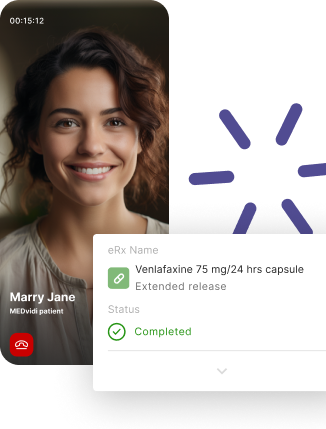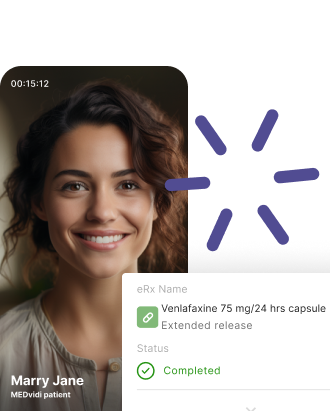Their inclusion does not guarantee they will be prescribed to any individual, as treatment decisions are ultimately at the discretion of healthcare providers. Healthcare providers may prescribe other medications or recommend non-pharmacological treatment based on the patient’s unique health circumstances and needs. Read more
Several antidepressants prescribed for anxiety treatment and benzodiazepines have a boxed warning, the most serious type of warning from the Food and Drug Administration (FDA). Certain antidepressants can cause suicidal thoughts or behaviors; benzodiazepines have an increased risk of abuse misuse, and addiction. Other types of medication prescribed for anxiety may also have specific warnings and precautions. Some anti-anxiety medicines are also controlled substances, indicating their high potential for misuse or dependence. Specific federal and state laws limit the amount of such medications that can be prescribed or dispensed within a certain period of time.
Highlights
- Medications for anxiety treatment include SSRIs, SNRIs, TCAs, benzodiazepines, beta-blockers, and buspirone.
- At MEDvidi, you can consult with a licensed healthcare provider from the comfort of your own home and get prescribed an anti-anxiety medication online if it’s clinically appropriate for you.
- Always take your medication exactly as prescribed by your healthcare provider.
Every year, about


How to Determine If You Need Anxiety Medication?
The first step toward determining whether you need anxiety medication is recognizing your symptoms and how they affect your life. When symptoms become persistent, overwhelming, or start to interfere with work, relationships, or sleep, it’s important to seek treatment. And if therapy, stress management, or lifestyle changes haven’t provided enough relief, a healthcare professional may recommend medication.
Common signs that often indicate the need for professional help, which may include medication, are the following:
- Excessive worrying
- Avoiding people, places, or things that cause worry or fear
- Trouble sleeping
- Irritability
- Restlessness
- Panic episodes
- Heart palpitations
- Apprehension about upcoming events
- Poor concentration
- Muscle tension
- Fatigue
How to Get Prescribed Anxiety Medication?
To get a prescription for anxiety medication, you need to consult with a licensed healthcare professional, either in person or online. MEDvidi offers online anxiety consultations with experienced, licensed medical providers.
Step 1: Create an Account and Book an Appointment
To get started, create an account on MEDvidi. Fill out a short intake questionnaire, include relevant information about your past medical and mental health history, what symptoms you’re currently experiencing, and any previous treatments you have tried. This information helps your clinician understand your situation before your appointment. Choose a time that is convenient for you (including same-day or next-day appointments) and see a healthcare provider online from the comfort of your home.
Step 2: Undergo Evaluation and Get a Treatment Plan
During your consultation, a licensed provider will conduct a comprehensive assessment to understand your symptoms, triggers, and how anxiety affects your daily life. They will want to know what previous treatments you have tried.
Based on the assessment, your provider will tell whether medication would be helpful, as well as review possible side effects and interactions. It’s important to know that a prescription is not guaranteed. Our healthcare providers prioritize safety and prescribe anxiety medication only when it’s deemed medically appropriate and beneficial.
Step 3: Prescription and Pharmacy Fulfillment
If your clinician determines that anxiety medication is suitable for you, they will send an online prescription (e-prescription) to the pharmacy of your choice. Depending on your pharmacy, you can choose to pick up your medication in person or have it delivered to your home.
Step 4: Follow-Ups and Adjustments
Your provider will likely recommend regular follow-up visits to monitor how well the medication is working for you. This is also a good time to discuss any concerns that you may have. Your doctor may adjust the dosage or switch medications if necessary.
Is It Difficult to Get Anxiety Medication?
Getting medications for anxiety is a straightforward process if you have a diagnosis and proven need for such treatment. You will have to consult with a qualified and licensed healthcare practitioner, and, if they determine medication is appropriate, they will prescribe it to you. The choice may depend on the severity of your symptoms and your health history. Based on these and other factors, your clinician will choose a suitable medication and provide you with detailed instructions.
Note that while open discussion is encouraged, the final decision on which medication to use rests with your healthcare provider.
Who Can Prescribe Anxiety Medication?
Several types of licensed healthcare professionals can prescribe anxiety medication, depending on your state’s rules and regulations. A healthcare provider must be licensed in your state in order to prescribe medication.
The following are the most common types of medical professionals who have the authority to prescribe anti-anxiety medication:
- Psychiatrists
- Primary Care Doctor (PCP)
- Medical Doctors (MD)
- Physician Assistants (PA)
- Nurse Practitioners (NP)
Medical providers at MEDvidi are authorized to prescribe anxiety medications after an online consultation in 33 states:
Can You Get a Prescription for Anxiety Medication Without Seeing a Doctor?
Anxiety medications are only legally available by prescription, so you should consult a licensed healthcare provider before starting treatment. If you prefer not to visit a clinic in person, you can schedule a secure online appointment with a licensed healthcare provider through a telehealth platform such as MEDvidi. During your appointment, your provider will review your symptoms and medical history, decide whether medication is the right option, and, if so, send a prescription to your pharmacy.
How to Ask a Doctor Whether You Need Anxiety Medication?
Talking about your mental health can feel uncomfortable, but it’s an important step toward getting the right care. MEDvidi offers a supportive, compassionate, judgment-free environment where you can openly discuss your symptoms and explore treatment options with licensed providers.
If you are feeling anxious and think you may benefit from medication to cope better, talk to a healthcare provider, keeping in mind the following:
- Be open and honest about your symptoms, how long you’ve experienced them, and how they affect your daily life.
- Share important details of your medical history, family history of mental health conditions, medications you are currently taking, past treatments, and other necessary information.
- Discuss available treatment options with your provider to choose the one most suitable for you.
- Ask questions and discuss your concerns about possible side effects, how the medication works, and what to expect during follow-up visits.
Transparency helps your healthcare provider make the safest and most effective recommendations for your situation.
Types of Anxiety Medications
The group of
- Selective serotonin reuptake inhibitors (SSRIs). SSRIs are typically considered the
first-line treatment[3] for most anxiety disorders. They work by increasing serotonin levels in the brain, which helps regulate mood and reduce anxiety. Common examples include fluoxetine (Prozac), sertraline (Zoloft), and escitalopram (Lexapro). - Serotonin and norepinephrine reuptake inhibitors (SNRIs). SNRIs work by increasing the levels of both serotonin and norepinephrine in the brain, which helps to regulate mood and lead to improved symptoms of anxiety and depression. Common examples include duloxetine (Cymbalta) and venlafaxine (Effexor).
- Benzodiazepines. These enhance the effects of gamma-aminobutyric acid (GABA), a neurotransmitter that promotes calmness. Because they work faster than some other anxiety medications, benzodiazepines are often used for acute anxiety and panic attacks. However, due to their potential for dependence and withdrawal, they are typically prescribed for short-term use. Examples include alprazolam (Xanax), clonazepam (Klonopin), and lorazepam (Ativan).
Beta-blockers[4] . These are primarily used to treat cardiovascular conditions. However, since they inhibit the hormone adrenaline, they help reduce the physical symptoms of anxiety, such as rapid heartbeat, sweating, and shaking. They are sometimes prescribed off-label for short-term use in performance or situational anxiety. Examples include propranolol (Inderal) and atenolol (Tenormin)Tricyclic antidepressants (TCAs)[3] . TCAs affect multiple neurotransmitters, including serotonin and norepinephrine, but they are generally prescribed only when SSRIs or SNRIs are ineffective or not tolerated. They can be useful in certain anxiety disorders but carry a higher risk of side effects. Examples include imipramine (Tofranil) and clomipramine (Anafranil)- Buspirone (Buspar). Buspirone is an anxiolytic medication that helps to manage chronic anxiety by regulating serotonin and dopamine levels in the brain. It is not habit-forming and has a lower risk of side effects. However, it may take
several weeks[5] for buspirone to achieve full effects.

What You Should Know When Starting an Anxiety Medication?
Some of the things you should keep in mind when starting any anxiety medications include:
- Make sure your healthcare provider answers all your concerns before you begin treatment. Don’t hesitate to follow up if you need additional clarification.
- Take the medication exactly as prescribed and avoid changing the dose on your own.
- Some anxiety medications may take several weeks to reach their full effect. Do not stop taking them abruptly, even if you don’t notice improvement right away. Stopping a medicine abruptly may cause withdrawal symptoms.
Be sure to schedule regular follow-up visits with your doctor. These check-ins allow your doctor to monitor your progress and adjust the dosage or switch medications if needed.
Safety and Side Effects of Anxiety Medications
All prescription medications, including those used for
Always tell your healthcare provider about any other medications or supplements you take, because even natural remedies can cause interactions. Take your medication exactly as prescribed and contact your provider if you notice any unexpected or bothersome symptoms.
If you ever feel unsafe or in crisis because of medication side effects or other symptoms, seek immediate professional help. You can reach out to your healthcare provider, call 911, or contact the Suicide and Crisis Lifeline by calling or texting 988.

Cost of Anxiety Medications
The cost of anti-anxiety medications may vary widely depending on the drug class, the dosage you are prescribed, and whether you use a generic or brand-name version. Generics are typically more affordable, often ranging from about $4 to $50 per month, while brand-name versions can cost between $100 and $400 or more. Insurance coverage can help reduce out-of-pocket expenses, and many pharmacies offer discount programs for common generic medications. If cost is a concern, discuss it with your healthcare provider. They can often recommend equally effective, lower-cost alternatives to help treat your symptoms.
How to Get Anxiety Medication Without Insurance?
With rising healthcare costs, getting an anxiety medication without insurance may feel challenging. However, there are some options that may help lower the costs, including:
- Discount programs and vouchers offered by community health clinics and some pharmacies.
- Generic versions are typically less expensive than brand-name alternatives.
- Consider telehealth services, since online consultations can often cost less than in-person visits.
Alternatives to Medication and Additional Support Options
Medication is not the only solution for anxiety disorders. Some patients benefit from other treatments as well. For example, therapies like
For many people, combining therapy with medication offers the most effective and lasting relief.
Conclusion
Getting a prescription for anxiety medication begins with meeting a licensed healthcare provider. After a detailed mental health assessment, they will create a personalized treatment plan that may include medication if deemed appropriate.
MEDvidi’s experienced medical team is dedicated to helping you through every step of the anxiety treatment process, including online medication management, making sure you receive the support you need.
Initial appointment
- An online 30-minute visit
- ADHD assessment
- Identifying treatment goals
- Developing a treatment plan
- Prescribing medications if required
Follow-ups
- Regular 15-minute visits
- Symptoms monitoring
- Recommendations on coping techniques, lifestyle, and thinking and behavioral changes
Frequently Asked Questions
How to get a refill for anxiety medications?
To refill or renew your prescription, consult with a healthcare provider. They will evaluate your symptoms and decide accordingly whether you need a refill. Remember to never stop taking your medication, change its dosage, or switch to another medicine without seeing your healthcare provider first.
What can you do in addition to taking medication for anxiety?
In addition to taking medication, healthy lifestyle habits like regular exercise, good sleep, balanced nutrition, and stress-reduction techniques (such as meditation or deep breathing) can help manage anxiety. Support groups and trying to pinpoint personal triggers may also be helpful. Your healthcare provider will guide you in choosing the strategies that work best for you.
Can you take medications without therapy while treating anxiety?
Yes, in some situations, healthcare professionals may recommend medication as a single treatment option without psychotherapy, depending on your symptoms and individual needs.
Why won’t my doctor prescribe me anxiety medications?
Your healthcare provider may decide not to prescribe anxiety medication for several reasons. They might recommend talk therapy or lifestyle changes first, or avoid certain medications due to risks like side effects, dependency, or health-related contraindications.
Can I get anti-anxiety medications over the counter?
No. All FDA-approved anti-anxiety medications require a prescription from a licensed provider. However, there are some OTC supplements available, including chamomile, valerian root, magnesium, and kava, that may help with mild anxiety disorder symptoms. It’s worth noting that research on their safety and effectiveness is limited. Therefore, it’s important to consult with a healthcare professional before using any OTC supplements to treat anxiety disorders.
Can I take anti-anxiety medication while on Suboxone treatment?
For safety reasons, patients must provide documentation from their clinician confirming it’s appropriate to take a benzodiazepine such as Xanax or an antidepressant while using Suboxone. Combining Suboxone with certain benzodiazepines
How to ask your doctor to increase your anxiety medication?
If the dose of medication you are taking doesn’t seem to be helping enough, talk to your healthcare provider about your symptoms and explain what has or hasn’t improved. Never increase your dose on your own. Your provider can decide if an adjustment is safe and appropriate.
How to get anti-anxiety medication from your doctor?
Schedule a consultation with a licensed healthcare provider to talk about your symptoms, how long you’ve been experiencing them, and how they affect your daily life. Your healthcare provider will evaluate whether medication is necessary, explain potential options, and prescribe medication if it’s clinically appropriate.
How to get anxiety medication without seeing a doctor?
You can’t legally obtain prescription anxiety medication without consulting a licensed medical professional. If you can’t have an in-person consultation, use telehealth platforms like MEDvidi to meet virtually with a provider through a video visit, so you can receive an evaluation and, if appropriate, an online prescription.
Can you get anxiety medication without talk therapy?
Yes. While talk therapy often helps, medication can be prescribed alone if your healthcare provider determines it’s appropriate for your symptoms and medical history. Your provider may still recommend combining both approaches for the best long-term results.
What do I say to my doctor to get anxiety medication?
The final decision about prescribing an anxiety medication is up to your healthcare provider, based on your symptoms and health history. During your visit, be honest about what symptoms you’re experiencing and how they interfere with your daily life. Let your healthcare provider know you’re open to discussing all treatment options, including medication, if appropriate. They will ultimately decide which treatment is most suitable for you.
How to get anxiety medication ASAP?
Telehealth services like MEDvidi offer same-day and next-day appointments with licensed healthcare providers. After a detailed evaluation, a healthcare provider will determine whether you need anxiety medication and will send a prescription digitally to a local pharmacy of your choice. If you need urgent help, reach out to a crisis hotline or visit an emergency department immediately.
Can I get anxiety medications prescribed online?
Licensed healthcare providers can prescribe medication online, according to local laws and regulations. At MEDvidi, you can get connected with a medical provider who is authorized to prescribe anxiety medication online when clinically appropriate.













